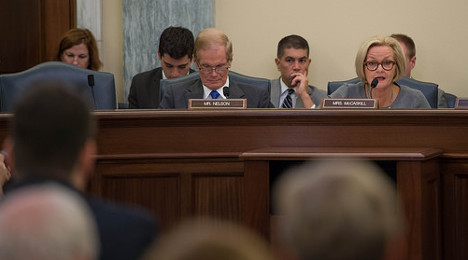Senator: Can NHTSA Be Effective ‘Cop on the Beat’?

Sen. Claire McCaskill conducted a hearing to question the National Highway Traffic Safety Administration about vehicle recalls. (Photo courtesy of McCaskill's press office)
By subscribing, you agree to receive communications from Auto Remarketing and our partners in accordance with our Privacy Policy. We may share your information with select partners and sponsors who may contact you about their products and services. You may unsubscribe at any time.
WASHINGTON, D.C. –
Sen. Claire McCaskill previously grilled General Motors chief executive officer Mary Barra about how the automaker investigated and recalled older vehicles with defective ignitions. Earlier this week, McCaskill took aim at David Friedman, deputy administrator of the National Highway Traffic Safety Administration, about the same issue.
During a Senate subcommittee hearing that lasted more than two hours, the Missouri Democrat questioned whether NHTSA is effectively operating as a needed “cop on the beat” when it comes to consumer safety.
McCaskill used a hearing of her consumer protection panel to examine implementation and enforcement of highway and vehicle safety laws and explore possible reforms as Congress works toward a long-term surface transportation bill. McCaskill pressed Friedman repeatedly on what tactics the agency is using to boost safety, and challenged him to take responsibility for NHTSA’s failures in safety oversight.
“We’re frustrated with you,” said McCaskill, a former prosecutor. “Nobody on this subcommittee believes that there aren’t people (at the agency) trying to do the right thing… but it’s hard to sit here and listen to you… Why you cannot take a measure of responsibility for that at this hearing has frankly got us scratching our heads. You want to obfuscate responsibility rather than take responsibility.
“How is the cause of an accident an optional question?” McCaskill continued, pointing out that a key question on causes of defects was optional. “You understand that reflects on a culture that's frightening, frankly. You understand I come from prosecutor background, and if you make the questions optional, that's never going to work.”
McCaskill and her fellow Senate lawmakers also touched on examples highlighted by the recent recalls at GM, saying, “The GM recall has shown us we still have serious deficiencies in how both automakers and auto safety regulators accomplish the task of ensuring the vehicles on the road are as safe as they can be.”
Subscribe to Auto Remarketing to stay informed and stay ahead.
By subscribing, you agree to receive communications from Auto Remarketing and our partners in accordance with our Privacy Policy. We may share your information with select partners and sponsors who may contact you about their products and services. You may unsubscribe at any time.
In his prepared remarks, Friedman defended the protocol NHTSA has in place, reiterating the role OEMs play in the entire process.
“The safety recall system established by Congress works most effectively when manufacturers make safety their top priority, root out safety problems at the earliest possible opportunity, and timely inform the agency,” he said. “Further, while every company has the right to challenge our conclusions about defects, when NHTSA raises serious safety issues with automakers, it is critical for them to work with us to quickly ensure the safety of their customers.
“In recent weeks, I have communicated these expectations directly to senior representatives of all major vehicle manufacturers as the agency works to establish a new normal when it comes to how all automakers deal with safety recalls,” Friedman continued.
With more than 250 million registered vehicles in the U.S., Friedman emphasized to lawmakers how challenging NHTSA’s responsibilities are and how resources to run the agency must be a priority.
“The data collection and analysis burden will only continue to grow and we look forward to working with Congress to ensure that NHTSA has additional resources to fulfill its safety responsibilities and respond effectively to emerging safety issues through these activities,” Friedman said. “We at the National Highway Traffic Safety Administration are dedicated to our mission of safety.”
Besides the back-and-forth dialogue between McCaskill and Friedman, witnesses at Tuesday’s hearing also included:
— Joseph Comé, deputy principal inspector general for audits and evaluations, Office of Inspector General, U.S. Department of Transportation
— Jacqueline Gillan, president, Advocates for Highway and Auto Safety
— Kendell Poole, chairman, Governors Highway Safety Association
— Robert Strassburger, vice president, vehicle safety and harmonization, Alliance of Automobile Manufacturers
This hearing also examined NHTSA’s implementation of highway and vehicle safety provisions of the Moving Ahead for Progress in the 21st Century Act (MAP-21), which included a number of reforms to safety programs — as well as McCaskill’s bipartisan legislation that would ban rental companies from allowing consumers to rent or sell vehicles that are under manufacturer recall. McCaskill challenged Strassburger on his group’s refusal to support the legislation, telling him she expects him to submit his own recommended language in short order if his group cannot find a way to support the bill.
McCaskill is chairman of the Senate Commerce Committee’s Subcommittee on Consumer Protection, Product Safety, and Insurance. The subcommittee has jurisdiction over several federal agencies, including NHTSA. As chairman, McCaskill held two hearings earlier this year on the GM recall of 2.6 million vehicles for defective ignition switches that have been linked to a number of deaths, and also held a hearing on rental car safety.


